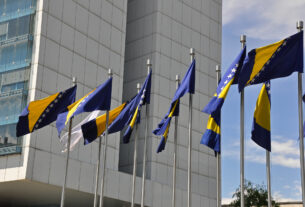Whenever making the official reports on rule of law in Serbia, European Union’s institutions keep pointing at the same old problem – corruption. However, special emphasis is always on high-level corruption, which threatens to swallow already shaken democratic institutions.
European Commission’s report on Serbia for 2021 stated that the legal framework for fight against corruption is broadly in place. Despite that, Serbian law doesn’t recognize formal criteria for determinating differences between petty corruption and high-level corruption, unlike some other countries’ legal frameworks. Instead, several indicators should be kept in mind.
Executive Director of Partners for Democratic Change Serbia Ana Toškić Cvetinović explained for European Western Balkans that it’s important to distinguish whether the potential perpetrator is a public official or not, as well as the amount of embezzled funds from the criminal offence.
Toškić Cvetinović stated that the difference can also be determined based on which Prosecutor’s office is in charge of the case. Although it is not filed under this exact term, the most high-corruption cases in practice end up in the Prosecutor’s office for organized crime (TOK).
She also added that there are some “other long-term criteria” in determining wheter is high-corruption taking place or not, which could be carrying the societal longlasting and profoundly impactful consequences such as “decreasing trust in institutions”.
Lawyer Marko Pantić, who mostly deals with criminal law, said for EWB that in order for TOK to deal with high-corruption, the main condition is existence of organized criminal group consisted of “at least four perpetrators”.
So, as he explained, if the case doesn’t fulfills this precondition, then the case would be taken by Special departments of higher public prosecutions for fight against corruption which are located in Belgrade, Novi Sad, Kraljevo, or Niš.
Defining high-corruption, or sometimes referred as grand corruption, could be ended with statement: high-level abuses of institutional power that benefits the few at the expense of the many.
According the Serbian law the important role in dealing with the high-corruption should be played by Anti-corruption agency, which is supposed to have the significant effect on citizen’s trust in institutional mechanism for corruption prevention. However, the exact same trust is nowdays one of the biggest issues in the whole system, stated Toškić Cvetinović.
So far, experience is the best indicator that the mentioned Agency is not up to its standards anymore.
The Group of the States against corruption (GRECO) praised the streghtening of this Agency, but also mentioned some of the existing problems: insufficient number of employees as well as lacking of Parliament discussions based on Agency’s reports.
Taking into account the other messages from previously mentioned EU Commision’s report, it is important to highlight their explanation of the need for better protection of whistle blowers in Serbia, because the importance of their role in exposing high-corruption cases. Like in the previous report, the Krušik case is again mentioned as an example of unfinished investigation.
Legal framework taken broadly in place but unsustainable in practise
According to the mentioned European Commision’s report, based on indictments from the Prosecutor’s Office for Organised Crime, the courts rendered first instance judgements in relation to the high-corruption against 22 individuals in 2020. In 2019, the number of same judgements was 30, while in 2019 it was 21.
There were final convictions against 11 persons. Regarding the number of conducted investigations, The Prosecutor’s Office for Organised Crime ordered them against 21 persons, and issued 19 indictments. On the other hand, the same Prosecutor’s office issued 20 indictments in 2019, 41 in 2018, and 50 in 2017.
Also, there were no cases with final confiscation of assets in 2020, compared to three in 2019.
Taking into account these data, it seems that Serbia is progressively becoming the state without corruption. However, is this the most accurate scenario, or there is something wrong relating the given data?
Ana Toškić Cvetinović explained that “unfortunately” these data doesn’t mean that high-corruption is nowadays a rare problem, but instead states that “the existing mechanisms are less and less activated”. She said that the corruption has become the “integral part of Serbian social system” adding that even the authorities “have lost faith than anything can be changed by processing individual cases”.
Recently made European Parliament’s report on Serbia urges state institutions to improve investigations and deliver results regarding the cases of Telekom Srbija, Jovanjica, Savamala, and so-called Pandora Papers, exposed by investigative journalists. However, most of these cases so far lack any reasons to believe that any high-level public officials would be prosecuted to the end.
Good practices in the neighborhood
It seems that Serbian judicial institutions don’t have enough level of autonomy nor sufficient power to deal with high-corruption cases. It is clear that something needs to be changed systematically in order to fight high-corruption.
The biggest weakness of the whole fighting corruption system is incompetence and the non-existant special mechanisms, like in other European countries, concluded Pantić.
There is no need to go far away through the old continent to find a possible solution. Office for the Suppression of Corruption and Organised Crime, known as USKOK, is Croatian’s specialized body so far very effective in dealing with high-corruption cases. Its organizational structure, separated from the other state attorneys, gives them a solid level of independence and relief from political pressure.
Indictments and conducted arrests made by this Office, such as those against former prime minister Ivo Sanader, or recent ones against culprits involved in the malversations in Croatian multinational oil company INA are a sufficient proof of their success.
USKOK could be used as model for establishing something similar in Serbia: which would be a huge step forward in dealing with high-corruption. Still, the political will is inevitable.
This article was published as part of the project “Civil society for good governance and anti-corruption in southeast Europe: Capacity building for monitoring, advocacy and awareness-raising (SELDI)” funded by the European Union.
The post Serbian institutional fight against corruption: Point blank shot? appeared first on European Western Balkans.





